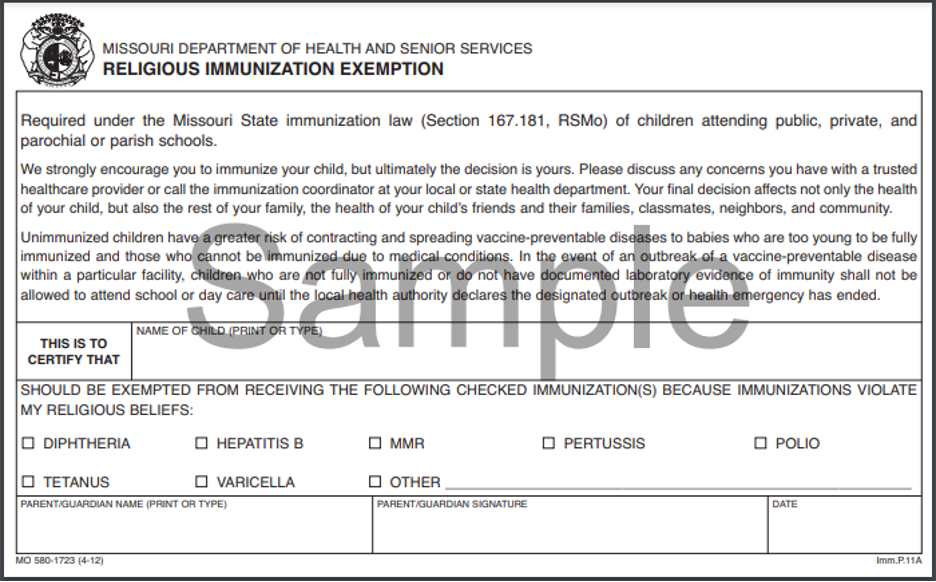Insights
Eighth Circuit Sides With Schools In Constitutional Challenge to Vaccine Religious-Exemption Form
Mar 18, 2021Summary
While the topic of vaccines dominates today’s news, the Eighth Circuit recently affirmed the dismissal of constitutional challenges to Missouri’s mandatory form for requesting a religious exemption to the state’s school-vaccination requirements. See B.W.C. v. Williams, Nos. 20-1222, 20-2207, --- F.3d ---, 2021 WL 833285 (8th Cir. Mar. 5, 2021). The challenges were filed in 2019, before the COVID-19 pandemic took root in the United States.
The plaintiffs, students in Missouri schools and their parents, alleged that the state’s Form 11 (shown below) violated their rights of free speech, free exercise of religion, and equal protection. Missouri law requires that students receive certain immunizations to attend school, but allows parents or guardians to seek a religious exemption to the mandatory immunizations by filling out Form 11. Parents or guardians can request Form 11 from a medical provider, the county health office, or by calling, mailing, or visiting Missouri’s Department of Health and Senior Services.
The top half of Form 11 states, “We strongly encourage you to immunize your child, but ultimately the decision is yours,” encourages parents and guardians to consult healthcare providers, and recognizes that refusing immunizations can impact the health of “the rest of your family, . . .your child’s friends and their families, classmates, neighbors, and community.” The bottom half of Form 11 allows parents or guardians to specify which vaccines the student is foregoing on religious grounds.

The plaintiffs objected to having to request and submit the form for various reasons. First, the plaintiffs contended that submitting the form, with its “pro-immunization messages,” would be unconstitutional compelled speech, forcing the parents to adopt a message with which they disagreed. Second, they argued that the Form 11 process violated their right to free exercise of religion because, among other things, having to request the form from a medical provider or the state would subject them to unwanted “forced education sessions about vaccines.” Third, the plaintiffs asserted an Equal Protection claim, arguing that the Form 11 process unfairly singles them out based on their religious beliefs. Finally, the plaintiffs asserted a “hybrid rights” theory, arguing that the combination of infringements on free exercise and other rights invalidates the generally applicable requirement that students be immunized or submit Form 11 to attend school in Missouri. The U.S. District Court for the Western District of Missouri dismissed the challenges for failure to state a claim, and the plaintiffs appealed.
The Eighth Circuit (a panel of Judges Gruender, Benton, and Stras) affirmed, rejecting each of the plaintiffs’ arguments on the merits. Writing for the panel, Judge Benton held that there was no compelled speech, as Form 11 makes clear that the “pro-immunization message” is the government’s message that the plaintiffs do not have to adopt. Also, the schools did not in any way limit the parents’ ability to air their objections in other ways in addition to requesting the exemption, as long as they filled out Form 11, at a minimum. Nor does the process of requesting and submitting Form 11 burden religious conduct, as plaintiffs’ ultimate religious objection is to the vaccines themselves, and being subjected to pro-immunization messages is no different from requiring a physician to provide truthful information to a patient deciding to have an abortion. Additionally, the court held, having to submit Form 11 does not single out religious observers as opposed to secular reasons for foregoing vaccines, as Missouri law imposes a blanket requirement that all students either be immunized or submit Form 11 (or another official form the state makes available for requesting exemptions based on other reasons), regardless whether the requested exemption is for religious purposes. Finally, the court rejected the plaintiffs’ “hybrid rights” theory, holding that plaintiffs may not “mix-and-match” constitutional rights to survive dismissal when each claim fails on its own.
While the cases pre-dated the rise of the pandemic in the United States, the plaintiffs’ appeal, the oral argument, and the court’s decision all occurred against the backdrop of the COVID-19 crisis and the high-profile rollouts of various vaccines. The court did not reference the current pandemic in its opinion; nor did the issue come up at oral argument. This is perhaps unsurprising, as the motion-to-dismiss record before the court was confined to the facial adequacy of the complaints’ allegations. It remains to be seen how the court will react to the COVID-vaccine-related litigation that is sure to come.
The court’s opinion is available here and, while awaiting publication in the Federal Reporter, is unofficially reported at 2021 WL 833285.
Related Capabilities
-
Appellate
-
Business & Commercial Disputes




